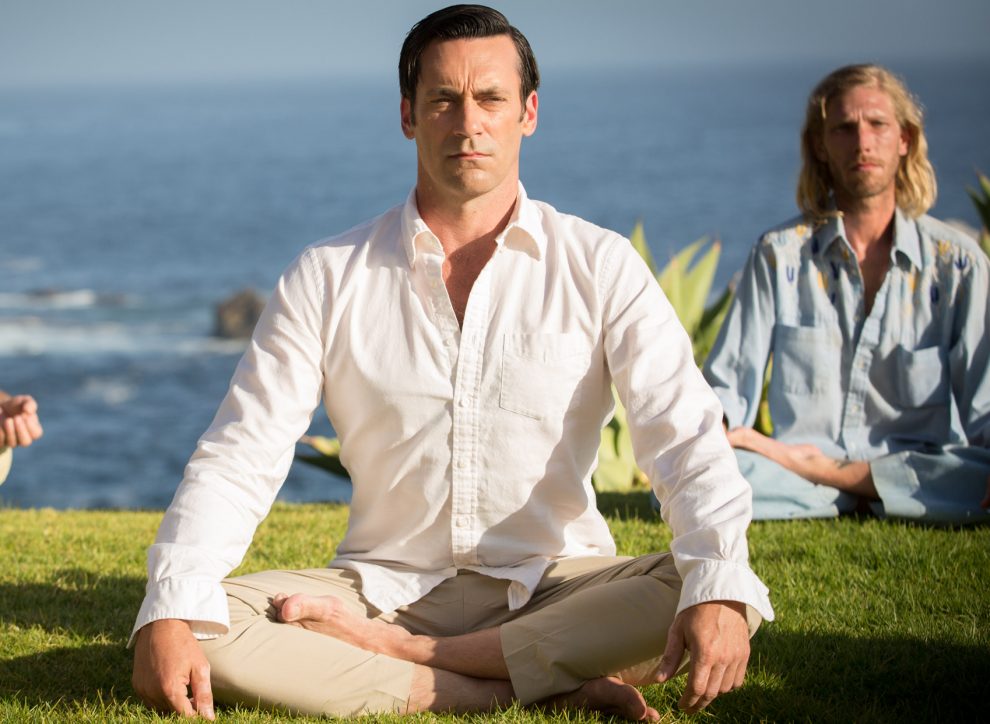c. 2015 Religion News Service
(RNS) In Sunday’s finale of the critically acclaimed AMC series Mad Men, Don Draper calls Peggy Olson collect from a pay phone in California. “I broke all my vows. I scandalized my child. I took another man’s name and made nothing of it.”
It’s a breathless moment of confession, one that confounds (and concerns) Peggy and leaves the rest of us waiting for some sign of personal redemption, however fleeting or thin. We’ve been waiting for the better part of eight years.
Whether the farewell episode redeemed Don Draper is, of course, a matter of interpretation. But here’s what we know beyond a doubt. For seven seasons, Matthew Weiner’s magnum opus has delivered some of the finest art the television medium has to offer. And it has done so by respecting the serial TV tradition and paying unrivaled attention to detail.
The result was a slowly unfolding period melodrama that should have been marginally successful but became a mainstream hit because it told a universally compelling narrative—a story about the tension between our consumeristic American existence and our deep-seated search for identity, meaning and fulfillment.
If that sounds generic, it shouldn’t. Mad Men transported us to the pivotal decade of the 1960s and dealt deliberately with the advent of Madison Avenue and the heyday of the advertising industry. This was the time in our nation’s history when our materialistic fates were sealed: We became a people defined by things, things produced in mass quantities to feed an insatiable cultural appetite. And that appetite was fueled by advertising.
Don Draper, the quintessential ad man, describes advertising early on in the series as “selling happiness.” In the boardroom, Don repeatedly does exactly that—creating scenarios that attach emotional, if not transcendental, value to otherwise common products and services. He brings his clients to tears or laughter or both, and opens their wallets besides. Deals are closed, Clio Awards are won. The ad man sells happiness and becomes a millionaire.
But the ad man is a fraud, and Don’s identity theft is constantly tearing at the veneer of personal and professional success. If we try to forget this and root for Don Draper the ad man, we are soon reminded again of Dick Whitman the coward and phony. If we are tempted to admire the style and sophistication of a millionaire executive and his glamorous dalliances, we are soon faced with the destructive results of his pathologically duplicitous personality.
In many ways, Don Draper is the incarnation of advertising itself: the lie that we are defined by things, that we derive meaning from what we consume.
This is what finally came to a head in Sunday’s finale, and people of faith would do well to heed the lesson. Don finally faces the effects of his lie. He experiences an eruption of reality. His ex-wife is dying of lung cancer and would rather their children live with an uncle than with their father. His daughter is disillusioned. His success is utterly unsatisfying and he’s burned professional bridges. He doesn’t know who he is.
After the phone call with Peggy, he falls to the ground. “I can’t move.”
For believers, the message is precisely an invitation beyond these lies about identity and meaning. It’s a call to repentance—turning away from seeking fulfillment in what we consume. It’s a call to faith—leaning into the ultimate reality that we are beloved by God and possess inestimable worth as those redeemed by God. It’s a call to action—living to embrace others in this new reality of belovedness, to find ourselves in serving people, not in consuming things.
Other key characters seem to find themselves in the Mad Men farewell. Pete Campbell changes careers and reunites with his ex-wife and child. Joan chooses creative expression—and her son—over excess and ease. Peggy learns “there’s more to life than work,” by listening to the one she loves. Roger marries a woman his own age.
Don’s fate, meanwhile, is a matter of interpretation, but I’ll offer mine. Rather than abiding by his dictum of “moving forward” and not looking back, starting over and taking on yet another identity based on a lie, he is headed in the opposite direction.
Back east. To Madison Avenue. With a brilliant ad idea.
But this time, it’s not about “selling happiness” to enrich himself, fulfill his lusts or make his mark. It’s about being close to his children. It’s about finding his true identity in loving and being loved.
Zach J. Hoag is an author, preacher, and content creator from New England. He writes at zhoag.com and The Huffington Post. His first book, Nothing but the Blood: The Gospel According to Dexter, is available on Amazon.)
Photo courtesy of Justina Mintz/AMC













